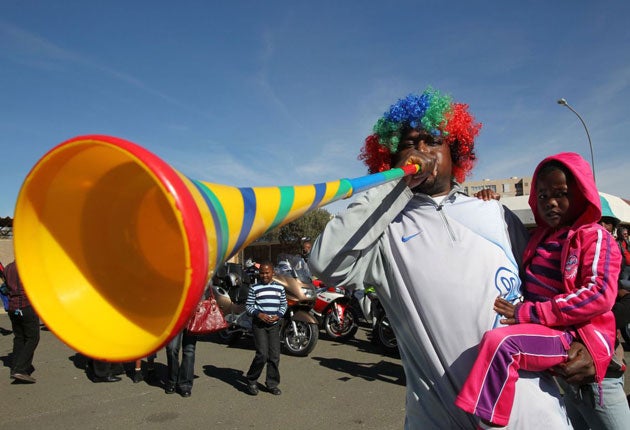Vuvuzelas to make a comeback?

Vuvuzelas, the long plastic horns that created a constant din — and plenty of debate — at games during this year's World Cup in South Africa, are on sale in New Delhi, and they have been selling steadily ahead of the Oct. 3-14 games.
"There is a lot of demand for the vuvuzela. A lot of demand," said Suresh Kumar, the chairman of Premier Brands, the Indian company in charge of merchandizing at the Commonwealth Games. "We have sold more than 12,000 pieces."
Loved by some and despised by others, the vuvuzela was a constant topic of conversation in South Africa. While the South African football fans embraced the atmosphere it helped create at games across the country, many broadcasters and viewers from abroad complained that the drone disrupted the enjoyment of watching games on television.
The debate hasn't deterred Commonwealth Games organizers in the Indian capital, where 50,000 vuvuzelas were imported from China for the event. There is no plan at this stage to bring in more, even though the plastic horns are the second-best selling product behind T-shirts, Kumar said.
Even Indian Sports Minister M.S. Gill got in on the act, standing with Commonwealth Games organizing committee chairman Suresh Kalmadi and blowing a vuvuzela on Wednesday at the athletes' village.
Because of the sounds that emanated from the World Cup, several Premier League clubs and even Wimbledon banned fans from using vuvuzelas at their venues. UEFA has also banned them from their European football competitions.
The Commonwealth Games may not cause as much of an uproar for viewers overseas, however. On Tuesday, Indian Tourism Minister Kumari Selja said only 200,000 of the 1.7 million tickets for the games have been sold.
The vuvuzelas are selling for 250 rupees ($5.50) and will be available at all competition venues and in some areas of the city, including the airport and train stations. They can also be bought online and from mobile stores that will visit schools and major residential areas.
Organizers hope the relatively inexpensive price — inexpensive for foreigners anyway — will help sales.
"This will enable everybody to own a piece of the games," the organizing committee said on its website.
Join our commenting forum
Join thought-provoking conversations, follow other Independent readers and see their replies
Comments
Bookmark popover
Removed from bookmarks